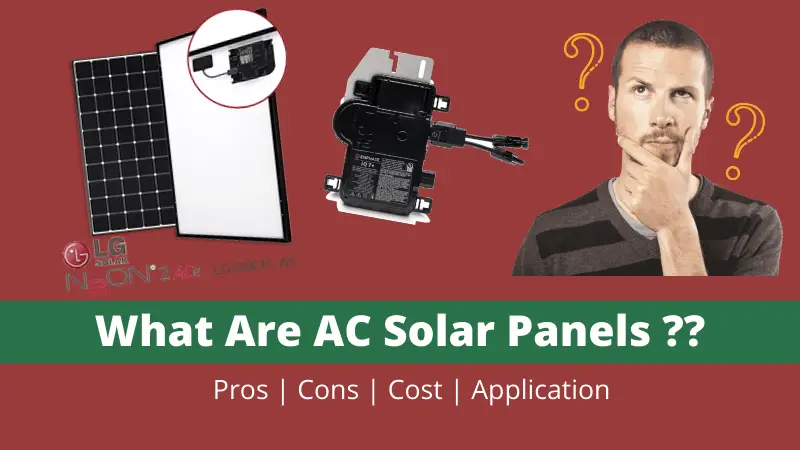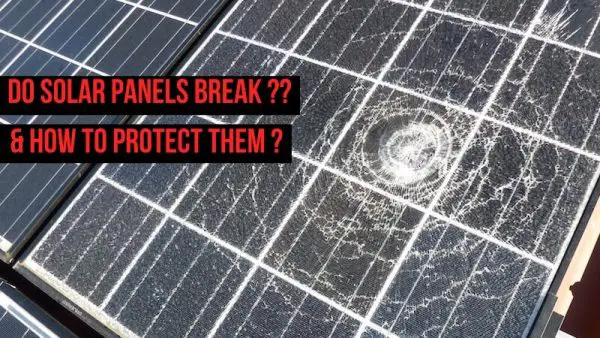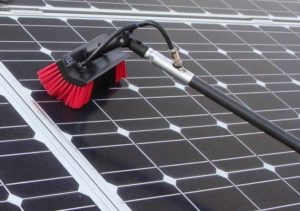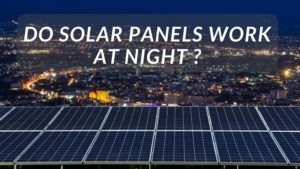In 2020 more and more companies are introducing AC solar panels to make solar installation plug and play type for the installer. In this article we will see what are AC solar panels, advantages & disadvantages of AC solar panels and when to use AC solar panels.
An AC solar panels are special type of solar panels with a microinverter attached to it. Unlike conventional solar panel which provides DC electricity as ouput, AC solar panels provide AC electricity as output due to the use of microinverter.
What Are AC Solar Panels?

No matter whichever solar panel you buy all of them will produce DC electricity and AC solar panel is no exception, so why the name?. An AC solar module is just like a normal solar panel but has a microinverter attached to it.
Due to this, the moment solar panels produce DC electricity it is converted into AC electricity by the microinverter hence, power coming out of each solar panel is AC rather than DC.
Because of the use of microinverter there is no need of a string inverter which makes the system more flexible.
In case of a solar power plant constructed using normal solar panels if any one of the solar panel in the entire string under-performs due to malfunction or any shadow impact, the entire strings power is reduced to the lowest performing panel in the string. Hence overall power generation of the system is compromised.
But if a solar system is constructed using AC solar modules, even if there is impact of shadow or any type of malfunction of any one solar panel it does not impact the entire string as the microinverter optimizes the power output of each solar panel. Hence overall power generation is not sacrificed.
Advantages of AC Solar Panels:
- Improved performance in shadow and cloudy weather conditions.
- Ease of increasing the plant size: The size of power plant which uses DC modules is (mostly) fixed due to inverter capacity. This means that expansion of such power plant may not always be possible. However, the plant using AC modules could initially have only a limited number of modules which can always be increased as and when required.
- Reduced installation time: An AC module forgoes the DC side cabling (and combining output via combiner box) until the inverter. This reduces the time required to set up the entire plant. Additionally the output from the AC modules can be directly (with added protection device) fed into the AC panel of the customer. This significantly reduces the number of components and amount of time required to install such components.
- Easy monitoring and failure detection: The latest micro inverters come with in-built communication system. Such devices are perfect match to monitor module level power output and failure detection. Any defect in the plant can be tracked down to module level and rectified within short span of time giving ease to operation and maintenance of power plant.
Disadvantages of AC Solar Panels:
Even though AC solar modules are easy to install and require less parts to complete a solar power plant, the overall cost of a solar system with AC module is more than a solar power plant with conventional solar panels.
Other disadvantage of AC solar module is the the lack of trust major installers and customers have with AC solar module. Even though it’s an old technology it is not widely used in large scale and there are not many successful projects to instill the belief among installers.
Top AC Solar Modules Manufacturers:
As of 2020 all the AC solar module available in the market use Enphase micro inverter (except LG). The following companies provide AC solar panels.
- LG – LG manufactures AC solar module under it’s NeON series, with entire solar panel and microinverter made by LG.
- SunPower – The SunPower Equinox AC solar panel combines a panel based on SunPower Maxeon cells with an Enphase IQ 7XS microinverter.
- Panasonic – Panasonic manufactures AC solar module N330E HIT 330 watt solar panel with an Enphase IQ 7X microinverter.
- Solaria – Solaria’s another american company manufactures PowerXT AC Module with the Enphase IQ7+ microinverter.
- Waaree Solar – Waaree solar is an Indian solar panel manufacturer which offers 335 watt, 72 cell AC solar module.
- Loom Solar – Loom solar is another Indian solar panel manufacturer that offers indigenous AC solar module.
Most of the AC solar panels have wattage ranging from 280 watt to 450 watt, with output voltage in the range of 240 V +/- 10 %.
When Should You Opt For AC Solar Modules:
If your roof has enough shadow free area to mount solar panels then I feel you should stick with conventional monocrystalline or polycrystalline solar panels.
However if your roof receives shadow AC then you can consider installing AC solar modules as they are less affected by shadows.
Conclusion:
AC solar modules as the name suggest are solar modules that provide AC current as output and they do this with the help of a microinverter on there back.
If you like this article then feel free to share it on WhatsApp, Facebook, Pinterest, Reddit any anywhere else.
Feel free to check out other articles on solar and saving electricity.
All suggestions and question about solar are welcomed in the comments section.
Thank You :).
Reference:
- https://na.panasonic.com/us/energy-solutions/solar/ac-series-ac-module/n330e-hitr-ac-series-enphase-iq-7x
- https://www.solaria.com/powerxt-ac-solar-panels
- https://enphase.com/en-us/ac-modules/partners/sunpower
- https://us.sunpower.com/solar-panels-technology/a-series-solar-panels





